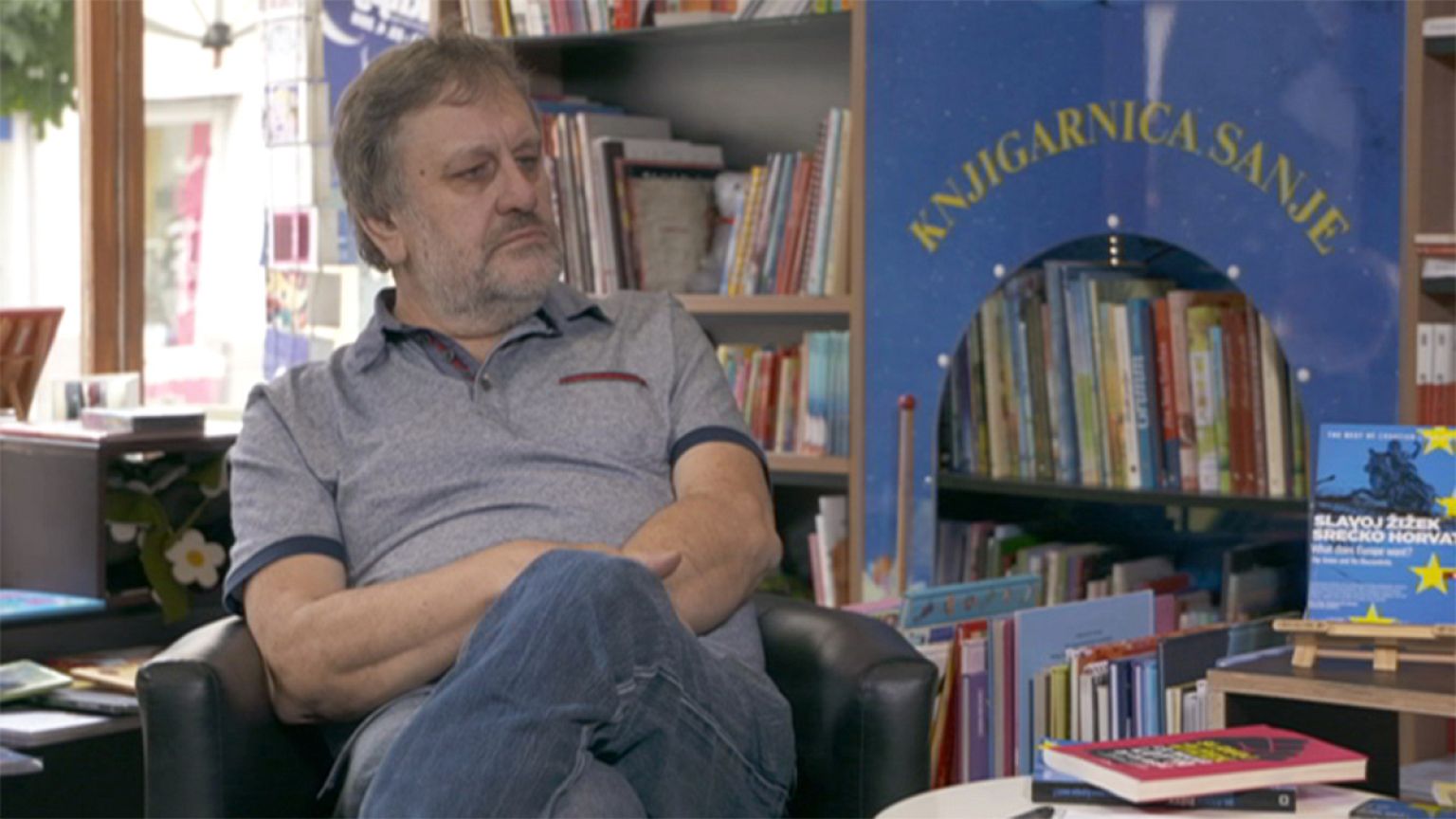Slavoy Zizek, a straight talking philosopher, spoke to Euronews in Ljubljana, Slovenia, for the Global Conversation
He does not hold back when it comes to his criticism of Europe and he is considered a revolutionary by many for his ideas to transform the global economic order.
 ADVERTISEMENT
ADVERTISEMENT
 ADVERTISEMENT
ADVERTISEMENT
Slavoy Zizek, a straight talking philosopher, spoke to Euronews’ Sergio Cantone in Ljubljana, Slovenia, for the Global Conversation.
Biography: Slavoj Zizek
- A Slovenian philosopher and psychoanalyst
- Considered a liberal leftist, but also criticises global capitalism and neoliberalism
- Through his last work – Against the Double Blackmail: Refugees, Terror and Other Troubles with the Neighbours – theorises about a new class struggle on a global level
- Senior researcher at universities in Ljubljana, London and New York
Sergio Cantone: “According to you, globalisation is one of the primary sources of the current migration crisis. Why?”
Slayoj Zizek: “I think that the other side of globalisation is the rise of new invisible walls. We have unemployed, we have precarious workers, even here in Slovenia. I read somewhere that almost half of the workers already work only precariously. You have failed countries, you have those who live in slums, who are excluded.
“So it’s no longer the old clear class distinction, it’s a much more vague distinction between those who are in, enjoying a basic security, full civil rights and so on and those who are out. We need some transnational power to enforce more global decisions. Ecology cannot be saved, migration cases cannot be saved without such mechanisms.”
Sergio Cantone: “But the European Union should deal with these kinds of transnational issues. But it failed. They are not doing that.”
Slayoj Zizek: “Yes, that’s the tragedy of the European Union. Europe doesn’t know what it wants. We have basically today two Europes. One Europe is this Brussels technocratic Europe – and even they, they just want somehow to be part of the global market, they don’t give a clear idea.
“Then we have the anti-immigrant populist Europe; this I think is the true threat to Europe. I am not really afraid of massive invasion; we will deal with that. I am really afraid of those who want to defend Europe today. Will a Europe where, for example, Le Pen is in power in France, and so on, will this still be the Europe that we all know – and I hope – love? Europe will still stand today for some emancipatory values, social security, equality, women’s rights and so on, and so on.”
Sergio Cantone: “Why should western weakened working classes and also middle classes join the struggle of impoverished masses from other continents?”
Slayoj Zizek: “You ask a very important open question which most of the left avoids, you know. Because … ordinary people who are afraid of migrants, in some sense they have a point. If Europe totally opens itself to migrants it’s not the rich who will suffer it’s them who will get less jobs, lower salaries probably; and so on and so on.
“So, the only solution I can imagine is to find, to make it clear, or to articulate a kind of a shared struggle, so that the problem is not just that of humanitarianism, will we receive refugees or not? But the problem is that there is a certain rage in Europe, like the decline of the welfare state, and so on and so on. What those dissatisfied people in Europe, what bothers them, is part of the same crisis: imbalance of global capitalism.
“And this is absolutely crucial, that we somehow connect our struggles with their struggles. If we don’t accept this, if we remain at this level – refugees are coming here, they are burdens and so on – than we are lost. We need transnational organisms able to make very strong decisions.”
Sergio Cantone: “With law enforcement capacities?”
Slayoj Zizek: “Absolutely, I don’t have any problem here.”
Sergio Cantone: “But this is the European Union, and it is rejected this idea …
Slayoj Zizek: “And that’s what makes me very sad. I mean ok it’s rejected. But what’s the alternative? I don’t see the alternative. Because if we renounce it and play the game of stronger nation states like … this is the idea in England.”
Sergio Cantone: “But the problem there is not Brussels, it’s the globalisation …”
Slayoj Zizek: “That’s what you said, that’s why I wouldn’t …”
Sergio Cantone: “The crisis of the welfare state is not due to … Brussels is the adaptation …”
Slayoj Zizek: “The critics of Brussels often ignore how Brussels is not just this bad global bureaucracy. Brussels also imposes a certain minimal work standards, and so on, maximum working hours, and so on.So that’s precisely why I still think the battle should be pursued within the European Union.”
Sergio Cantone: “Donald Trump. The phenomenon of Donald Trump.So the US is facing a kind of revolutionary period?”
Slayoj Zizek: “Of course, Trump is personally disgusting, bad racist jokes, vulgarities and so on. But at the same time did you notice how he said some very correct things about Palestine and Israel? He said we should also see Palestinian interests and approach the situation in a more neutral way. He said we should not just antagonise Russia, find a dialogue there. He was even for higher minimal wages. He hinted that he would not like simply to cancel Obama’s universal health care, Obama care …”
Sergio Cantone: “He is a liberal centrist …”
Slayoj Zizek: “Yes! That’s my provocative thesis! That if you scrap this ridiculous and, I admit it, dangerous surface, he is a much more opportunist candidate and his actual politics perhaps will not be so bad.”
Sergio Cantone: “Does Russia, and does China, represent a different model of economic order, economic and political organisation, an alternative which could also antagonise the western one?”
Slayoj Zizek: “Yes, but here I am totally on the side of the West – moderately. Because it does stand for an alternative, but it’s simply a proto-fascist authoritarian capitalism alternative. I know this very well, I was in China, I debated with them, and all those apparently subtle Confucian justifications of the communist regime, their point is always the same one: ‘we cannot afford democracy, that would mean social explosion, we need some kind of …’. They always use these fascist terms without being aware. We need some corporate stability where everyone is at his or her own place, there must be an order granting solidarity and so on. So, they want a conservative modernisation. And unfortunately capitalism is moving into this direction, I claim.
Sergio Cantone: “May I ask you a last question; it’s a personal one.”
Slayoj Zizek: “Oh my god, I think I am not a person, I’m a monster …”
Sergio Cantone: “You said about yourself that you are the Elvis of philosophy. Is that …”
Slayoj Zizek: “No, I didn’t. I hate this! You are talking now like an enemy, and when we, the people, will take power we will … you will get Gulag for five years! For five years, yeah. This is all spoken by people who attack me in a much more intelligent way than direct attacks: ‘I am a crazy Stalinist, confused …’ You know they admit that I have a certain popularity, but that strategy … basically the message of this, I’m Elvis, is ‘look he is an amusing guy, you can go to listen to him, but it’s pop philosophy, a joke, don’t take it seriously’, and so on and so on.”














